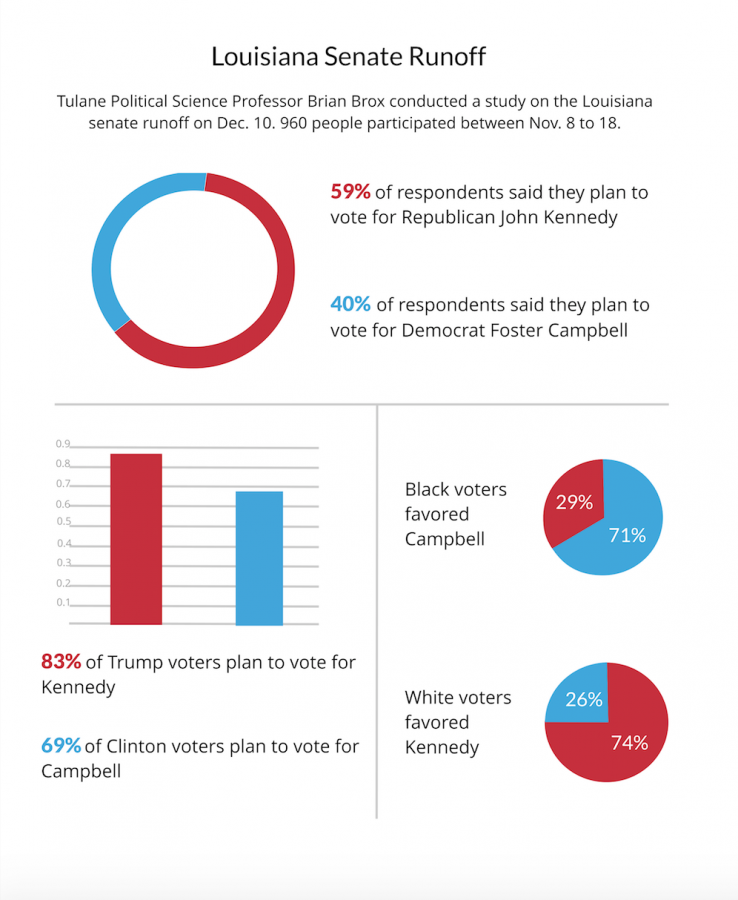Study shows cross-party trends in LA senatorial runoff
The 2016 election season has not ended yet.
Political Science Professor Brian Brox set out to see where Louisianans would fall come Dec. 10 in the senatorial run-off between Republican John Kennedy and Democrat Foster Campbell. Brox’s online survey received 960 responses revealing trends this election season up and down the ballot.
“We see the Republican, as you would expect in Louisiana, with a pretty sizable lead,” Brox said. “I also saw some interesting results related to how either Clinton and Trump voters from the presidential race and all the candidates in the primary that didn’t make the runoff — how their supporters are breaking.”
The study found that while most voters are staying with their candidate, some trends show voters jumping across party lines.
Thirty-one percent of Democrat Hillary Clinton’s voters and 28 percent of Democrat Caroline Fayard’s voters plan to support Kennedy. Twenty percent of Tea Party Republican Rob Maness’ voters plan to support Campbell.
Brox said Clinton voters are making the switch because they were moderates or slight conservatives who “just couldn’t bring themselves to vote for Trump.” Now these voters are returning to their original stances. As for Fayard and Maness, Brox has less speculation as to why voters are switching.
“To some degree, politics in Louisiana is very personality driven,” Brox said. “Foster Campbell is a democrat, but he is a conservative democrat. It is possible that there are people that were voting for another Republican, but for some reason don’t like Kennedy and would rather vote for a conservative democrat.”
While the South has traditionally been conservative, Louisiana has not always been a red state. In the 20th-century, the South mainly supported Democrats until the late 1960s and ’70s and cemented the shift in the ’80s with President Ronald Regan’s election.
“After the 1960s, the democratic party has become pretty much just a liberal party,” Brox said. “So conservatives have figured out that there really isn’t a place for them to be represented in the current democratic party.”
Another trend among the Louisiana constituency is the discrepancy of support among differing races. Seventy-one percent of black voters support Campbell, while in contrast, 74 percent of white voters said they would support Kennedy.
“Louisiana will continue to be differentiated by race,” Brox said. “African Americans in the state will vote overwhelmingly for democrats. Whites in the state will vote overwhelmingly for Republicans. Given that whites are a majority of the population, republicans will continue to win statewide races.”
Brox plans to continue his research into this election season. In January, the political science department will do another big project in the week of President-elect Donald Trump’s inauguration on Jan. 20.
For many Tulane students, this is only the beginning of their political involvement, and Brox said that they should focus and vote in future elections such as the midterms and the next presidential election. In 2021, many states will be redistricting giving a lot of power to the sitting legislature.
“Politics is cyclical. Politics is ongoing,” Brox said. “We are going to have state elections in 2017 here in Louisiana; we will have midterm elections in 2018 and another presidential election in four years. Tulane students have a lifetime.”
If you would like to see full results of the survey, click here.
Your donation will support the student journalists of Tulane University. Your contribution will allow us to purchase equipment and cover our annual website hosting costs.




Leave a Comment